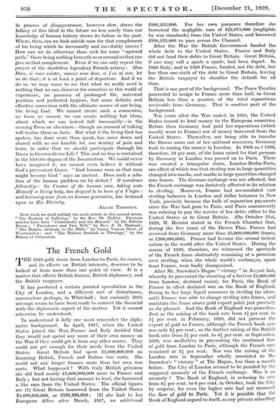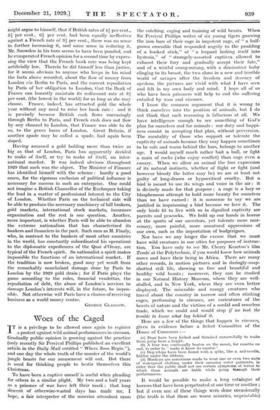The French Gold
THE 1929 gold drain. from London to Paris, its causes, and its effects on British interests, deserves to be looked at from more than one point of view. It is a matter that affects British finance, British diplomacy, and the British taxpayer.
It has produced a certain puzzled speculation in the City of London, and a different sort of disturbance, unconscious perhaps, in Whitehall ; but curiously little attempt seems to have been made to connect the financial with the diplomatic aspect of the matter. Yet it cannot otherwise be understood.
To understand it fully one must remember the diplo- matic background. In April, 1917, when the United States joined the War, France and Italy decided that they would not spend any more of their own money on the War if they could get it from any other source. They could not get enough for their needs from the United States. Great Britain had spent £2,000,000,000 on financing British, French and Italian war costs. She could not any longer finance more than her own war costs. What happened ? With truly British grimness she did lend nearly £1,000,000,000 more to France and Italy ; but not having that amount to lend, she borrowed a like sum from the United States. The official figures are (1) Great Britain borrowed from the United States 14,600,000,000, or X958,880,000 ; (2) she lent to her European Allies after March, 1917, an additional £936,255,000. For her own purposes therefore she borrowed the negligible sum of £22,075,000 (negligible by war standards) from the United States, and borrowed £936,255,000 to pass across the Channel.
After the War the British Government funded the whole debt to the United States. France and Italy did not fund their debts to Great Britain. Great Britain, if one may call a spade a spade, had been duped. In 1926 Italy, and in 1929 France, funded, not the debt, but less than one-sixth of the debt to Great Britain, leaving the British taxpayer to shoulder the default for all time.
That is one part of the background. The Peace Treaties proceeded to assign to France more than half, to. Great Britain less than a quarter, of the total reparations receivable from Germany. That is another part of the background.
Ten years after the War ended, in 1928, the United States ceased to lend money to the European countries: Before then Germany had paid her reparations (which mostly went to France) out of money borrowed from the United States. Thereafter, not being able to transfer the Dawes sums out of her national resources, Germany took to raising the money in London. In 1928 and 1929, therefore, 52 per cent. of the loans raised for that purpose by Germany in London was passed on to Paris. There was created a triangular drain, London-Berlin-Paris, one effect of which was that sterling was in large quantities changed into marks, and marks in large quantities changed into francs. The German exchange was not affected, but the French exchange was decisively affected in its relation to sterling. Moreover, France had accumulated vast sterling balances in London and dollar balances in New York, precisely because the bulk of reparation payments since the War had gone to Paris, and Paris concurrently was refusing to pay the service of her debts either to the United States or to Great Britain. (On October 21st, 1929, M. Herriot stated in the French Chamber that, during the five years of the Dawes Plan, France had received from Germany more than 25,000,000,000 francs, or 1200,000,000). France had become the second richest nation in the world after the United States. During the course of 1929, therefore, we witnessed the spectacle of the French franc obstinately remaining at a premium over sterling, when the whole world's exchanges, apart from France, were badly disorganized.
After Mr. Snowden's Hague " victory " in August last, whereby he prevented the shunting of a further /2,000,000 from London, destined mainly for Paris, the Bank of France in effect declared war on the Bank of England Owing to her huge liquid resources in sterling (as afore- said) France was able to change sterling into francs, and maintain the franc above gold export point just precisely as she pleased. And the Bank of England was powerless. Just as the raising of the bank rate from 42 per cent. to 5i per cent. in February, 1929, did not prevent the export of gold to France, although the French bank rate was only 31 per cent., so the further raising of the British bank rate from 51- per cent. to 6-i per cent. in September, 1929, was ineffective in preventing the continued flow of gold from London to Paris, although the French rate remained at 31 per cent. Nor was the raising of the London rate in September wholly unrelated to Mr. Snowden's " victory " at The Hague, less than a month before. The City of London seemed to be puzzled by the supposed anomaly of the French exchange. Was it an anomaly ? The Bank of England, in reducing its rate from 6.1 per cent. to 6 per cent. in October, took the City by surprise, for even the higher rate had not stemmed the flow of gold to Paris. Yet it is possible that the Bank of England argued to itself, as any private schoolboy Might argue to himself, that if British rates of 41 per cent., 51 per cent., 61 per cent. had been equally ineffective against a -French rate of 31 per cent., there was no sense in further increasing it, and some sense in reducing it. Mr. Snowden in his turn seems to have been puzzled, and he exasperated French opinion for a second time by expres- sing the view that the French bank rate was being kept artificially low. Therein he did himself less than justice, for it seems obvious to anyone who keeps in his mind the facts above recorded, about the flow of money from London via Berlin to Paris, and the current repudiation by Paris of her obligation to London, that the Bank of France can honestly maintain its rediscount rate at 3f per cent. (the lowest in the world) for as long as she may choose. France, indeed, has- attracted gold the whole year without any need to raise her bank rate : and it is precisely because British cash flows unceasingly through Berlin to Paris, and French cash does not flow by any channel to London, that France was able to do so, to the grave harm of London. Great Britain, if another spade may be called a spade, had again been duped.
Having amassed a gold holding more than twice as big as that of London, Paris has apparently decided to make of itself, or try to make of itself, an inter- national market. It was indeed obvious throughout 1929 that such was the object. The Minister of Finance has identified himself with the scheme : hardly a good omen, for the rigorous exclusion of political influence is necessary for success in such an enterprise. One could not imagine a British Chancellor of the Exchequer taking the lead in a matter of professional interest to the City of London. Whether Paris on the technical side will be able to produce the necessary machinery of bill brokers, gold markets, international stock markets, insurance organization and the rest is one question. Another, more important, is whether Paris will be able to abandon the extreme nationalism that has characterized its bankers and financiers in the past. Such men as M. Finely, who, in contrast to the bankers of most other countries in the world, has constantly subordinated his operatiods to the diplomatic expediences of the Quai d'Orsay, are typical of the French spirit. So nationalist a spirit makes impossible the functions of an international market. If the tradition is now broken, good may yet result from the remarkably nonchalant damage done by Paris to London by the 1929 gold drain ; for if Paris plays the game according to the rules, financial vendettas, the repudiation of debt, the abuse of London's services to damage London's interests will, in the future, be impos- sible. Not otherwise will Paris have a chance of receiving business as a world money centre.
GEORGE GLASGOW.



































 Previous page
Previous page